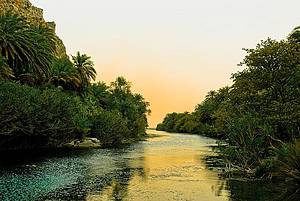Analysis shows up combination in fire disaster States
Analysis of catastrophic wildfires in Russia and Greece has highlighted a deadly combination of climate change impacts and the neglect of forest management, WWF organizations in the two fire prone countries said today.
 |
|
Rare palm forest of Preveli in Crete, an early victim of resurgent forest fires in Greece. |
In the joint statement, WWF-Russia and WWF-Greece said the catastrophic wildfires that hit Russia during the first two weeks of August awoke the memories of the tragic Greek "black summer" of 2007. Fires have now flared up in Greece, where the national budgetary crisis has seen fire defences downgraded.
“Although the weather did not favor mega-wildfires during June and July, as the 2010 summer ends Greeks witness once more the dramatic ecological consequences of forest fires, " said Demetres Karavellas, Director of WWF Greece.
"Yesterday, we lost to the flames one of the most important forest ecosystems in the Mediterranean, the rare and endemic palm forest of Preveli in Crete.”
![Russian volunteers ride on a trailer Thursday as they prepare to fight a fire at a forest near the village of Tokhushevo, some 50 kilometers outside Sarov. [Photo: Xinhua via Global Times/AFP] Russian volunteers ride on a trailer Thursday as they prepare to fight a fire at a forest near the village of Tokhushevo, some 50 kilometers outside Sarov. [Photo: Xinhua via Global Times/AFP]](http://images.china.cn/attachement/jpg/site1007/20100824/0019b93bd68d0ddda50e03.jpg) |
|
Russian volunteers ride on a trailer Thursday as they prepare to fight a fire at a forest near the village of Tokhushevo, some 50 kilometers outside Sarov. [Photo: Xinhua via Global Times/AFP] |
Key factors turning wildfire into wildfire disaster
The analysis of key contributing factors that turn wildfire into wildfire catastrophe included gaps in national forest legislation, understaffed and under-equipped forest management and fire suppression authorities, little emphasis on cost effective preventative measures and poor mobilization of public support for forest protection.
“According to the official data, this summer about 1 million hectares of forests were burnt, 14 natural protected areas of federal importance are burning at this very moment, at least 127 villages turned into ashes and 52 people were killed because of forest fires,” said Dr Evgeny Shvarts, Conservation Policy Director for WWF Russia..
“According to rough estimations, the fires released something like the annual carbon emissions of Germany into the atmosphere to aggravate climate change.
“Most of forests and villages destroyed by fire were located in the most heavily populated European part of Russia, where forests have a special social and ecological value.
“This catastrophic situation roots in recent thoughtless administrative reforms of forest management, resulted in decreasing of federal control over forest resources planning and use, elimination of the federal forest rangers service and decreasing of specialized forest fires monitoring and fire fighting centers’ potential.
“We believe that urgent measures are needed by the Government of Russia to revise results of the forest management reforms made since the year 2000.”
 0
0 






